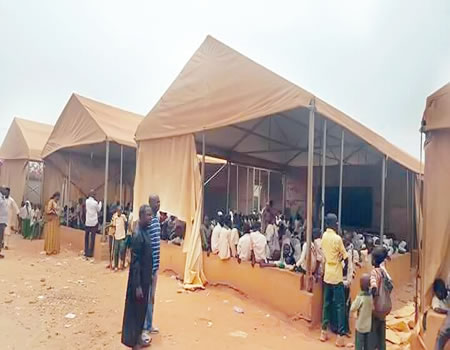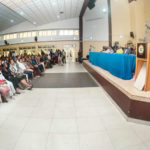
Rigasa is a community located in Igabi Local Government Area of Kaduna State. With a population of three million people and covering about 14 by 8 kilometers, it is the biggest community in the state and arguably in the North.
Rigasa was initially populated by tribes such the Kataf and Gbagi, and they lived with the Hausa. However, in 2000 when the religious crisis broke out in the state, these tribes, according to Abubakar Rigasa, a resident, moved to another area in the southern part of Kaduna after selling of their property to the Hausa.
Today, Rigasa is now predominantly a Hausa community and has expanded to Hayin Danmani and Hayin Mallam Bello, which are being administered by villages heads.
But whatever innocence that Rigasa might have had at his formative years, the community had completely lost it in the course of time. Over the years, some youths in the area have turned the community into a nest of terrifying, predatory birds. They commit all kinds of crime at will and even prey on law enforcement agents.
A resident, who pleaded anonymity, said that these youths engage in burglary, arson, rape, sodomy etc, and that police and security operatives, are afraid to come to the community.
That could be expected, especially after the police lost a Divisional Police Officer some years ago because he freed a suspect. He was said to have been traced to his house by some persons, who allegedly felt offended that the suspect was freed, and murdered before his wife and children.
Another case said to have been the handiwork of the gang, Sunday Tribune gathered, was the gruesome murder of a pregnant woman whose stomach was ripped open so they could kill the fetus.
According to a woman who gave her name as Sahura, “every day, babies are dumped on refuse sites and inside gutters. Though, this menace has reduced, we still have reports of the dumping of new born babies in awkward places in the community,” she stated.
In Rigasa, it is common to see young single mothers and/or pregnant ladies who have been left to fend for themselves and their babies by these young men who would have denied ownership of such babies and/or pregnancies, hence the high rate of unwanted pregnancies in the community. In addition, drug abuse has increased among the teeming youths, as well as among married women.
Many believe that lack of educational facilities should be blamed for the high crime rate in the community. Rigasa, as large as it is does not have more than three public schools. In one of the public schools, LEA, along Lokoja road, there are over 30,000 pupils in the school, with each class having no fewer than 500 pupils. Many of the pupils, it was said, had no chairs and tables to write on.
“Pupils were sitting on the bare floor until one of the oil companies built makeshift structures that we have here today,” said a resident, who explained that during the rainy season, the pupils are always exposed to the harsh weather.

“I now feel fulfilled. For the first time in decades, we now feel we are part of the state,” Idris enthused.
But the attention of government in education has not stopped the criminality in the community. Piqued by these growing anti-social activities, some concerned residents of Rigasa community came together to establish the Central Safety and Security Patrol Unit to check the trend, as well as protect the residents.
According to Aliyu Adamu Usman, volunteer youths were recruited under the guidance of former police and military officers living in the area to provide security to the densely populated area.
“These retired military personnel teach these youths how to tackle criminals in accordance with the law,” Usman told Sunday Tribune, adding that “the volunteer security outfit had succeeded in reducing crime in the community. We can now sleep with our eyes closed.”
Commending the police for their role in curtailing crime in the area, Usman noted the challenges facing the law enforcement agency. He is worried that not much policing can be done by the small number of officers in the area. He pointed out that it is impossible for one police station to take care of three million people and thereby called on the authorities to see the efforts that these young volunteers do as complementary.
Usman, who is also leader of the Police Relations Community Committee, called on the authorities to build more police stations in the area because of the size and population of the area.
During a visit to the area as part of his resolve to engage the community in community policing, the state Police commissioner, Austin Iwar, commended the community for setting up the volunteer security outfit, but warned them against taking laws into their own hands.
According to him, he was told that visitors never wanted to come to the area, while many among those currently living in the area are ashamed to identify with the community. “Today, the story has changed with the effort of the volunteer security outfit,” he said.
Not only did the police boss acknowledge that every community has to be proactive in tackling the various security challenges, he remarked that the area needed not fewer than five additional police stations. He, however, quipped that it would not be a bad idea if the community built one, and assured them that the police authority could send additional policemen and women.
Iwar promised to help the people beef up security in the area by deploying additional 20 police officers whose schedule would be to patrol the entire area for 24 hours.
WATCH TOP VIDEOS FROM NIGERIAN TRIBUNE TV
- Relationship Hangout: Public vs Private Proposals – Which Truly Wins in Love?
- “No” Is a Complete Sentence: Why You Should Stop Feeling Guilty
- Relationship Hangout: Friendship Talk 2025 – How to Be a Good Friend & Big Questions on Friendship
- Police Overpower Armed Robbers in Ibadan After Fierce Struggle





